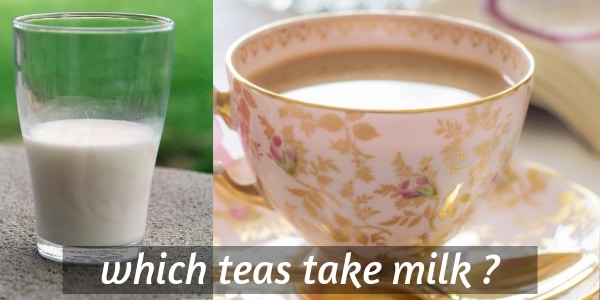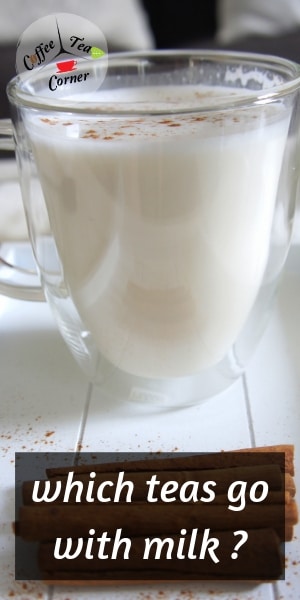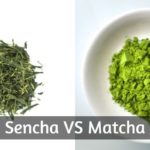If you're looking to tone down your tea, you might want to know which teas take milk in the first place. Some are going to be a great fit, and some are going to be a bit off for some people.
And then some teas have no business mixing with milk, which we all need to be aware of.
So let's start with the teas that do take milk, and then briefly go through the ones you should never add milk to.

Table of Contents
So which teas go with milk ?
Bold, malty flavors go very well with milk.
This means black teas, almost all of them, so very well with a dash of milk, and even a bit of sugar.
Then there are the teas that contain the right type of flavor, the nutty, buttery, caramel-like teas. So, almost any rooibos tea will go very well with milk.
And finally, chai (heavily spiced teas) do take a bit of milk, since they're so strong-tasting they need a bit of milk to balance them.
So there you go. There's 3 main types of tea out there that take milk, and they're not that hard to find. Of course, you can try them with and without milk, so you can figure out which you like best.
Now let's get into a bit more detail, since not all versions of the teas I mentioned above go well with milk.
1. Black teas are great with milk, much like coffee
Black teas are a great candidate to mix with milk, or to mix milk into, since they have such a strong flavor.
Especially Assam teas, which are often the strongest black teas.
This is very true for plain black teas. So breakfast tea are great with milk, much like coffee is.
Black teas also contain caffeine, which means you can realistically replace your morning coffee with black tea. It's not going to give you as big of a jolt like a cup of coffee, but you'll be much more focused and alert, without the jitters.
Back to black milk, in its most plain version, it's got a strong, malty, slightly nutty flavor. It can be hard to drink by itself, so many people choose to add milk and sugar to this tea.
As for the black tea versions that are blended with fruits, I do not recommend adding milk. That being said, that's very much a personal preference.
For me, the mix between fruits and milk flavors doesn't sit very well. So for example, and Early Grey should not contain any milk, as far as I'm concerned.
Though I've met people who do add just a dash of milk to that tea blend.
Black tea with floral notes is much like the black with fruit notes, so again, I don't recommend adding any milk. But you're still welcome to try it out, you might find out you like it.
What I do think goes great with milk is black tea blended with flavors that go naturally well with milk. Like hazelnut, chocolate, vanilla, caramel, any kind of nut actually.
A perfect example is this one by The Republic Of Tea. They've got a wonderful black tea, blended with vanilla and almonds. This is a combination that's going to go great with milk. Any milk, anything you throw at it's going to work great because of the vanilla.
You can find the listing for this tea on Amazon, right here.
It's a loose leaf tea and comes in a 3.5 oz/100 gr package. This means it'll brew anywhere between 40 to 60 cups of tea, depending on how much tea you use per cup.
Personally, I'd try and make milk tea out of this one, since the flavor combination is just delicious.
2. Rooibos teas blend their sweetness with milk
Rooibos teas are very, very different from black tea. They're not from the same plant, and they have a very different taste.
Rooibos teas are fairly sweet on their own, and kind of don't need anything else. They're not overly sweet, but they're not harsh.
They resemble a sort of caramel in taste, and are very pleasant to smell.
Adding milk to a rooibos tea is going to go great, as I've tried this with plain rooibos too. As long as you don't overdo the milk, you'll have a nice, creamy finish to your tea.
One of my favorite blends is rooibos with bits of caramel, and a hint of vanilla. Of course, that all goes very well with milk, and is something we brew almost every day in autumn.
As with black tea blends, rooibos blends that go well with milk often include chocolate or cocoa nibs, vanilla, caramel, nuts, toffee, and anything else along those lines.
Fruity or floral blends aren't very common with rooibos teas. But if you do have one, I doubt it would go well with milk. Look at the fruits/flowers your tea is blended with. Would it taste good with a sip of milk ?
If you use that as a guideline, you'll be fine.
Here's an example of a nice rooibos that's blended with a flavor that goes well with milk: gingerbread.
Yes, this is gingerbread rooibos tea, and it's by The Republic Of Tea. It comes in the form of teabags, and it's a large bag - 250 teabags for you to enjoy.
You can find the listing for this tea on Amazon here.
Adding any bit of milk is going to be a great addition to this flavor. Not only is rooibos naturally sweet and caramel-like, there's some nice ginger and cinnamon flavor as well.
I'm thinking this could make a very tasty latte.
3. Many chai teas get a splash of milk too
Chai teas a beautiful way to enjoy spices, and not be overwhelmed by all of them.
Any and all chais are very bold in flavor, and often spicy. that's great, and it's something hat's going to sit well with milk.
You see, the dash of milk will keep the spices' taste but cut down on the heat/spiciness. Which means you'll be able to enjoy the flavor of cinnamon and black pepper, without too much heat coming from them.
A great chai tea is this one by Vahdam. It's a loose leaf tea that's got serious flavor and will hold up very well to any amount of milk you can throw at it.
Since it comes in loose leaf form, you can make the tea as weak or as strong as you like and it'll still come out great. Just remember that chai tends to be a little on the spicy side.
You can find the listing for this tea on Amazon right here.
(If you like this article so far, you can pin it to your Pinterest board by clicking the image below. The article continues after the image.)
What kind of milk can you add to tea ?
What about the milk you can add to tea ? Well, you can add pretty much any kind of milk you like, with a caveat.
Do not add creamer or high-fat milk.
3.5% milk is alright, but go much more above that and your tea will taste gross.
This is because tea is much 'thinner' than fat milk or cream. It would be overpowered by the richness of the cream, and be hard to drink in the first place.
Adding too skimmed a milk is also a poor idea, since it mostly just waters down your drink.
So 0.1% milk is pretty much like adding water, and most of the milk flavor is gone.
You can read much more about which milk is best to add to tea here, and you'll find both dairy and vegan options in that article.
Which teas should you never add milk to ?
Some teas out there can't take any milk at all. Knowing which teas these are is going to save you a lot of trouble when picking out the next tea box to bring home. Or even what to order off a menu.
Green tea loses its properties if you add milk
Green tea is notorious for being astringent and harsh tasting, especially of brewed wrong.
It's meant to have a grassy, grape-like taste. But it's not a tea that will ever go well with milk.
Never mind the green tea lattes or matcha lattes some companies offer. While milk would technically help green tea taste better, it actually will not.
It also cancels out many of the benefits of pure green tea or matcha.
Oolong is too complex for milk
Oolongs are a wonderful tea type, but they don't go well with milk at all. They'r something of a blend between green tea and black tea.
Actually they're green tea leaves that were processed almost as much as black tea leaves.
This means they will retain part of that green flavor, and still be a poor decision to add milk to.
Also take into account that oolongs are very complex teas, and they have more flavors that you can identify in the first few sips.
No point in ruining or muting those flavors with milk.
If you're drinking oolong tea and feel the need to add something to it, then you probably don't like oolong teas, or bought a low quality one.
Pu'er is great on its own
Pu'er tea is another example of tea that does not go well with milk.
This is because it's a sort of dry, fermented type of tea. It matures over years and years, and adding milk will again ruin the flavor.
Some Pu'er teas are designed to obtain a nutty flavor, so you might be tempted to add milk.
If you do add any, make sure it's just a bit, in a separate cup. It might not go as well as you think.
White tea should have no milk or sugar added at all
White eta is a very delicate and fine tea. It's the kind of tea you need a well developed palate for, otherwise it tastes fairly bland or watery.
Once you're able to distinguish its different flavors and appreciate how delicate it is, you'll also notice milk has no business with it.
It can be overpowering in every way for white tea, and there is nothing to counter it.
No malt, no nutty flavor, no bitterness, nothing.
IF anything, white tea is a bit floral and would actually clash with milk.
Can you add milk to herbal teas ?
Yes and no. AS in, it's completely up to you, however I would advise against it.
Not all herbal teas are okay with milk. For example jasmine tea, or pine bud tea, or mint tea would be horrible with milk.
However, sweeter, balmier herbal teas probably would.
Like for example chamomile, daffodil, even valerian root would be nice to mix with milk.
I've never added milk to herbal teas, since I saw no reason for it. But if you'd like to pioneer this, then by all means try it out.
It might turn out that some herbal teas go great with milk, but no one's tried it before. You might discover something others overlooked.
Final thoughts
Whether you add milk to your tea or not, I hope you keep an open mind, and are willing to try things out.
Some teas are terrible with milk even when you utter the idea. Then some other teas leave room for guess.
I for one have never added milk to anything other than rooibos and black teas, and found that green tea should never contain milk.
If you want to know more about coffee or tea, feel free to check the related articles below. Who knows what else you might find ?








